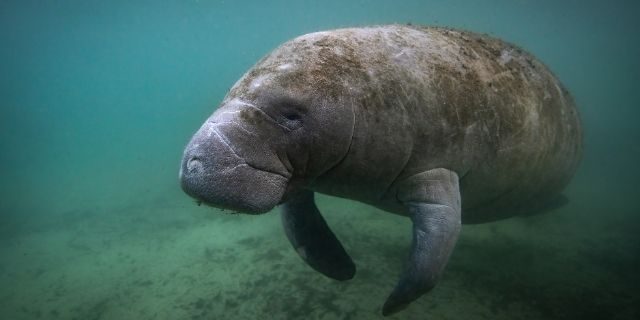27
Jan
Manatees in Florida Seriously Threatened from Pollution, Pesticides, and Other Human-Induced Stressors

(Beyond Pesticides, January 27, 2022) Wildlife officials in Florida have resorted to supplementing starving manatees with cabbage and lettuce in an attempt to keep their rapidly dwindling populations alive. Massive Red Tides exacerbated by runoff from urban and agricultural pollution have directly killed off dozens of manatees over the last several years, but the indirect effects of these harmful algae blooms have been most catastrophic, resulting in significant loss of the seagrass beds upon which manatees rely. While Florida Governor Ron DeSantis has announced plans to spend $481 million on water quality improvement projects, conservationists note that the funds are primarily directed toward point source wastewater treatment, and more is needed to address nonpoint source herbicide and fertilizer runoff from agricultural, and urban and suburban yards.
Florida manatees, a subspecies of the West Indian manatee, can live as long as 60 years old, weigh up to 1,200 lbs, and have no natural predators within their range. The biggest threat to these peaceful marine mammals is human activity and environmental stressors. Unfortunately, the former is well-known to exacerbate the latter. Humans harm manatees primarily through boat strikes, but the animals can also die from eating or becoming entangled in fishing equipment, or become stuck in canal locks or other flood control structures.
There is evidence from the peer-reviewed literature that human-induced stressors like the use of glyphosate (Roundup) herbicides, which are a “pseudo persistent” (resulting from continuous runoff or exposure) pollutant in Florida waterways, can increase manatee susceptibility to other natural causes of mortality. This includes the effects of red tide and cold stress in the winter months, as manatees are unable to survive in waters below 68 degrees Fahrenheit. Because manatees are the only marine mammal that drinks freshwater, they are more likely to drink from highly contaminated runoff flowing directly into local waterways, such as home lawns, city parks, and golf courses. Research finds that 55.8% of manatees have glyphosate in their bodies.
Ongoing glyphosate and other herbicide use on farms, turfgrass, and directly in waterways to manage species identified as “invasive” is particularly concerning in the context of the current crisis. Incidents of Red Tide and other harmful algae blooms are exacerbated by nitrogen and phosphorus runoff from industrial farms and highly manicured landscapes. These algae blooms cause a trophic cascade. Floating on the surface, algae blocks sunlight to seagrasses and other submerged aquatic vegetation. As seagrass is lost, manatees and other animals that rely on it for food and habitat also suffer. In this context, glyphosate, a phosphorous-based herbicide, can either directly kill off more aquatic vegetation, or feed algae blooms as it breaks down. According to recent reporting, in just one region, Sarasota Bay, 18% of seagrass was lost between 2018 and 2020. The Florida Governor’s plan to target wastewater treatment is an important part of the puzzle, particularly in light of major incidents like the Piney Point spill, but advocates say that more must be done to reduce demand and clean up diffuse sources of pollution as well.
In 2017, the U.S. Fish and Wildlife Service moved Florida manatees from fully endangered to threatened status under the Endangered Species Act. However, with recent reports indicating over 1,000 manatees died in just the last year alone, a bipartisan group of Florida Congressional delegation, Rep Vern Buchanan and Rep Darren Soto, has introduced legislation that would reclassify the sea cows as endangered.
In the meantime, feeding programs appear to be at least partially successful, attracting a large number of manatees to a site, which may be expanded in the future. But this is a last resort scenario.
It is critical that lawmakers and the public take a holistic look at the problems facing manatees and other marine wildlife, and take meaningful action to reduce the need to store tons of fertilizer in precarious lagoons, and spray these and other harmful chemicals on expansive areas of land throughout the state. Organic land management and organic agriculture must be a large part of the solution. By eliminating toxic pesticide and synthetic fertilizer use, and focusing on maintaining or improving soil health, organic practices can stop nonpoint source runoff from making its way into local water bodies.
Residents in Florida and around the country are encouraged to contact their local and state lawmakers and urge them to move towards safer, natural practices that do not rely on toxic pesticides or fertilizers.
All unattributed positions and opinions in this piece are those of Beyond Pesticides.
Sources: Washington Post, FL Gov press release, Herald-Tribune, FOX13 News, Save the Manatee










